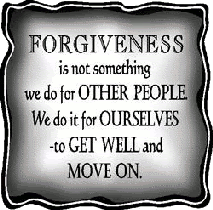Forgiveness is not something you do for someone else; it’s something you do for yourself. To forgive is not to condone, it is to refuse to continue feeling bad about an injury.
– Jim Beaver, Life’s That Way: A Memoir

I love Byron Katie. I think reading her book “Love What Is” helped me a lot as a person, a mother, a partner and a life coach. In my coaching, I cover many aspects of Byron Katie’s techniques and I have been asked by my clients to share it here on my blog, so they can teach it to their families.
Think of your mind as a house, prime real estate. The different qualities of your house include tenants knocking at your door, asking to rent some space there. As a property manager, you want to rent the space to very good tenants and avoid the trouble makers. Judgment is like a very important tenant. As much as you think you do not want it residing in your mind, it is very important and no house can survive without it. We all have to have some definition of the world so that we can navigate through life efficiently. Still, it is important not to give judgment the biggest room when we talk about judging others. Forgiveness on the other hand is a very important tenant. If you have a few trouble tenants, it can help you manage them and bring peace in your mind.
When kids are born, the ratio of space taken up by judging (of themselves and others) versus forgiveness is 1:100. They do not judge themselves or others that much but are extremely forgiving. This is why they try things again and again without giving up, and why they can start playing again so soon after being upset. Over time, the ratio changes and by the time they are adults it is more like 100:1.
 Here is a simple way to change the ratio. If you practice forgiving people, it is like give your forgiveness tenants more space in your mind. This will decrease your judgment of self and others, meaning your judgmental tenants will have a smaller room, and your mind-house tenants can live in peace with each other.
Here is a simple way to change the ratio. If you practice forgiving people, it is like give your forgiveness tenants more space in your mind. This will decrease your judgment of self and others, meaning your judgmental tenants will have a smaller room, and your mind-house tenants can live in peace with each other.
Whenever you are critical or judgmental of others, try to reverse the judgment on yourself. For example, if you think your child is lazy, ask yourself, “Where in my life do I behave in a lazy way?”. When you complain that your partner does not trust, you ask, “Where in my life do I not trust him/her?”. This exercise requires courage. When you ask yourself these questions, you will always (always) find situations in your life where you behave the same. The first time I did it, I was 16. I blamed half of the world for everything that did not go well in my life. When I realized I was doing similar things, I felt free and powerful.
Why?
Because before, the tenants in my head were at war. After the exercise, they were at peace. Before, whatever other people did or did not do controlled what I felt. Afterwards, I was in charge of my own feelings and thoughts. Before, I was stuck thinking about what happened in the past. After, I could move forward and create the future I wanted.
We can easily see faults in others and cannot recognize that we have all those qualities residing in our house as well. Often times, if we are honest enough, we can see that in some circumstances, we behave the same. Since we are aware of our own circumstances, we forgive ourselves more easily. If we understand what causes us to behave like this, this can help us understand what specific circumstances brought the other person to behave in such a way.

Be happy,
Ronit











